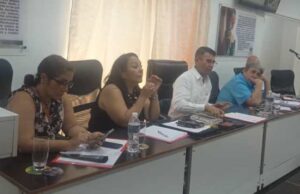Issues related to the development of the nation were recently approved in an extraordinary session of the Council of Ministers, among them, several draft bills, including the Code for Children, Adolescents and Youth.
The legislative schedule that has been implemented in the country for several years is diverse. As part of the actions contained in it, the agenda of the most recent extraordinary meeting of the Council of Ministers – led by the member of the Political Bureau and Prime Minister, Manuel Marrero Cruz – included the examination and subsequent approval of four draft bills related, fundamentally, to issues in the social sphere of the nation.
In this regard, Cuba’s highest governing body agreed to exercise legislative initiative and submit to the President of the National Assembly of People’s Power, the draft bills on the Cuban Sports System; the General Regime of Contraventions and Administrative Sanctions; the Civil Registry, as well as the Code of Children, Adolescents and Youth.
Of special significance was the approval by the members of the Council of Ministers of the aforementioned Code which, according to the explanation offered by the Minister of Education, Naima Ariatne Trujillo Barreto, was submitted to a broad consultation process to guarantee the creation of an inclusive, integral and representative final text that reflects the rights and perspectives of children, adolescents and young people, as well as the involvement of all the actors involved.
The Code, he said, aims to promote the comprehensive development of children, adolescents and young people, the respect and full exercise of their rights, and to establish the institutional framework to guide, promote and implement policies, plans and programmes that guarantee their protection, participation, inclusion and contribution to social development.
The legislation will regulate, among other elements, the content of these rights, taking as essential pillars the right to life, survival and development, participation, non-discrimination and acceptance of the heterogeneity of children, adolescents and young people.
On the other hand, according to the information offered by the Minister of Justice, Oscar Silvera Martínez, the preliminary draft of the Civil Registry Law responds to the need to improve and computerise it, and to reinforce its institutional framework; to adapt the civil registry function to the current context, and to establish a differentiated disciplinary regime for the civil registrar.
The registry function is extremely broad and complex, he said, as it is related to various areas of society and, as a means of contributing to the formation of statistics, it is of vital importance in the planning of public policies related to the population.
Equally important for the progress of the legislative schedule in Cuba was the approval of the Policy for the Improvement of the Contraventional System and the draft bill on the General Regime of Contraventions and Administrative Sanctions, also presented to the Council of Ministers by the Minister of Justice.
Silvera Martínez considered this to be a complex project, which meant that the drafting process took several years. By way of example, he said that the diagnosis revealed, among other things, the existing legislative dispersion, which makes it difficult to understand what is regulated.
The purpose of the draft bill, he said, is to regulate the general regime of administrative offences or infractions, as well as the administrative sanctions applicable to their commission.
The draft bill of the Cuban Sports System Law, presented by Osvaldo Vento Montiller, president of the National Institute of Sports, Physical Education and Recreation of Cuba (Inder), was also analysed and approved during the meeting, which he described as «the first of its kind in the country».
The document aims to establish the general legal framework of the Cuban Sports System, setting out its foundations, material and personal spheres, objectives, general principles, components, organisation and functioning.
It is a modern, inclusive, robust, transparent law, which rescues and confirms the best experiences of the Cuban sports system and in the future will undoubtedly become an important pedagogical instrument, because it is based on the thinking of the greatest athlete, our Commander-in-Chief Fidel Castro Ruz, said Vento Montiller.
PROTECTING AND MANAGING THE NATIONAL HERITAGE
During the extraordinary session of the Council of Ministers – which was also attended by the president of the National Assembly of People’s Power and the Council of State, Esteban Lazo Hernández, and the vice-president of the Republic, Salvador Valdés Mesa, both members of the Political Bureau – the proposal for the candidacy of the Viñales Geopark as a UNESCO World Geopark was approved.
In presenting the issue, the Minister of Energy and Mines, Vicente de la O Levy, explained the reasons behind the candidacy of the Viñales Geopark, which could become the first of its kind in the Caribbean area to achieve this Unesco category.
The Viñales Geopark, he explained, is a unique and unified geographical area, where sites and landscapes of national geological significance are managed with an integrated concept of protection, education and sustainable development, while using the geological heritage in connection with all other aspects of the existing natural and cultural heritage. These and other characteristics, he explained, support the submission of our nomination.
He added that there are 229 Unesco geoparks in the world in 50 countries, of which 13 are located in Latin America, but none in the Caribbean.
Its approval, he said, would contribute to the conservation of the geological and natural values of the area, with the consequent attraction of visitors interested in geology, landscape and local culture, while generating income for the communities located there.
Speaking on this point, the Prime Minister stressed the importance that a world-class Geopark would have for tourism in Viñales, which would give relevance, added value and strength to commercialisation. Special attention, he emphasised, should be paid to the issues associated with the urban and territorial planning of this municipality.
In relation to the issue of urban and territorial planning, the Urban Planning Plan for the city of Santiago de Cuba was also approved at this extraordinary session of the Council of Ministers, which was presented by the president of the National Institute of Territorial Planning and Urbanism (Inotu), Major General Raúl Omar Acosta Gregorich.
The previous Plan, he recalled, was drawn up in 2014, after the passage of Hurricane Sandy through this eastern province, and was based, fundamentally, on solving the problems of the physical-spatial structure, housing and urban image.
According to the explanation given to the members of the Council of Ministers, the fulfilment of the actions designed will make it possible to achieve the desired urban planning model, which will favour the equitable, inclusive and sustainable development of the environment, as well as achieving the functioning of the urban system, the rational use of resources, the improvement of the quality of life and the well-being of the population of the city of Santiago de Cuba, ensuring its economic and social development in the short and long term.
In this sense, the President of Inotu drew attention to the need for the urban development plans to become working tools for all governments in each of the territories.
In this respect, the Prime Minister stressed that, wherever housing development areas are defined to build housing, there must be a reconciliation with infrastructure, because in all areas, before any action is planned, urbanisation and all that this implies must be taken into account.
On this issue, the member of the Political Bureau and Secretary of the Council of Ministers, José Amado Ricardo Guerra, mentioned important concepts of the leader of the Cuban Revolution, Army General Raúl Castro Ruz, associated with the fulfilment of this issue in the national territory. In this way, he recalled that the purpose is not to prohibit construction, but to order how and where to build.
As part of the meeting’s agenda, the Comptroller General of the Republic, Miriam Marbán González, presented a group of actions that were approved by the members of the Council of Ministers, aimed at preventing and confronting the situation and tendencies of corruption in the administrative sphere. (Author: Yaima Puig Meneses)




